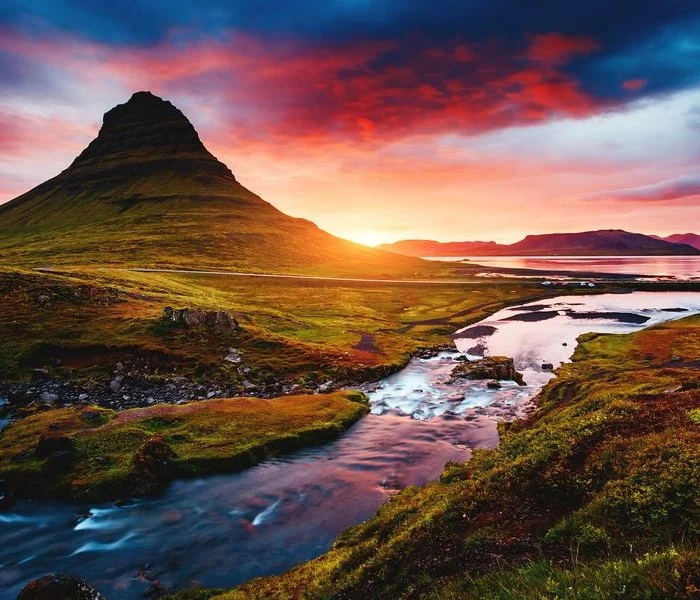Iceland
GMT (UTC+0)
No daylight saving time observed
Consistent year-round
Icelandic Krona (ISK)
Local symbol: kr
Cash is common; cards widely accepted
From Norse settlers to a modern republic
Rich sagas, volcanic eruptions, and maritime heritage
A legacy shaped by isolation and natural forces
Visa-Free Countries
Visa on Arrival Countries
E-Visa Countries
Visa Required Countries
Culture
Icelandic culture is deeply intertwined with its dramatic landscapes and Norse heritage. From ancient sagas to modern music and art, Iceland embraces both tradition and innovation.
Key elements of Icelandic culture include:
- Norse Heritage: Iceland’s history is steeped in Norse legends, medieval sagas, and a deep connection to nature.
- Literature and Music: The island is known for its literary traditions and a vibrant music scene ranging from folk to contemporary genres.
- Art and Design: Minimalist design, public art installations, and modern architecture reflect Iceland’s innovative spirit.
- Geothermal Lifestyle: Natural hot springs and geothermal pools are not only tourist attractions but integral to local wellness traditions.
- Festivals and Folklore: Celebrations like Þorrablót and cultural events highlight Iceland’s unique customs and communal spirit.
Today, Iceland blends its ancient past with modern creativity, offering visitors a unique cultural journey in a land shaped by fire and ice.
Tourism & Best Sites to Visit
Iceland is renowned for its stunning natural wonders—from geysers and waterfalls to glaciers and volcanoes. Visitors can explore vibrant cities and remote wilderness alike.
Here are some of Iceland's most remarkable destinations:





Reykjavik: The charming capital offers a mix of modern culture, vibrant nightlife, and historic sites, including museums and picturesque harbors.
Blue Lagoon: This world-famous geothermal spa is known for its milky blue waters, rejuvenating properties, and stunning lava field surroundings.
Golden Circle: A popular route featuring Þingvellir National Park, the erupting geysers of Strokkur, and the powerful Gullfoss waterfall.
Vatnajökull National Park: Home to Europe’s largest glacier, this park offers dramatic ice formations, glacial lagoons, and rugged volcanic landscapes.
Snæfellsnes Peninsula: Often called “Iceland in Miniature,” this region showcases a variety of landscapes including lava fields, coastal cliffs, and charming fishing villages.
Transportation
Iceland offers a range of transportation options suited to its unique landscape. Whether you prefer to drive, take a domestic flight, or join a guided tour, there are convenient ways to explore the island.
- Air Travel: Keflavík International Airport serves as the main gateway, with domestic flights connecting Reykjavik to regional hubs.
- Car Rentals: Self-driving is popular and offers flexibility to explore remote areas—4WD vehicles are recommended in winter.
- Bus Services: Intercity and tour buses provide affordable options for navigating between major sites.
- Guided Tours: Organized tours offer a hassle-free way to explore natural attractions with expert guides.
With well-maintained roads and reliable domestic air services, exploring Iceland’s diverse landscapes is both accessible and rewarding.
Airports
Iceland’s airports are modern and efficient, ensuring seamless travel connections for international visitors and domestic explorers.
- Keflavík International Airport (KEF): The primary international gateway located near Reykjavik, offering extensive global connections.
- Reykjavík Domestic Airport (RKV): Serving domestic flights and private charters, it provides easy access to regional destinations.
- Other Regional Airports: Smaller airfields around the country facilitate charter and seasonal flights to remote areas.
Taxis, car rentals, and shuttle services are readily available at all major airports, ensuring a smooth transfer to your destination.
Visa & Travel Information
As a member of the Schengen Area, Iceland follows unified visa policies. Many Western travelers enjoy visa-free entry for short stays, while others must secure a Schengen visa.
Visa Options by Nationality
The table below outlines visa requirements for common nationalities:
| Nationality | Visa Requirement | Maximum Stay |
|---|---|---|
| Citizens of EU/EEA countries | Visa-Free | No Limit |
| Citizens of USA, UK, Canada, Australia, and most Western nations | Visa-Free | 90 days (Schengen) |
| Most other nationalities | Schengen Visa Required | 90 days |
Visa Application Process: For travelers requiring a visa:
- Submit your Schengen visa application at the Icelandic consulate or embassy in your home country. Required documentation typically includes a valid passport, recent photograph, travel itinerary, and proof of accommodation.
- Travelers from visa-exempt countries should verify if an ETIAS authorization is needed when it becomes mandatory.
Entry Requirements: Visitors must have:
- A passport valid for at least three months beyond your planned departure
- A valid visa or ETIAS authorization (if applicable).
- Proof of sufficient funds and confirmed travel arrangements.
- Travel insurance covering medical expenses and repatriation.
- Return or onward travel tickets.
